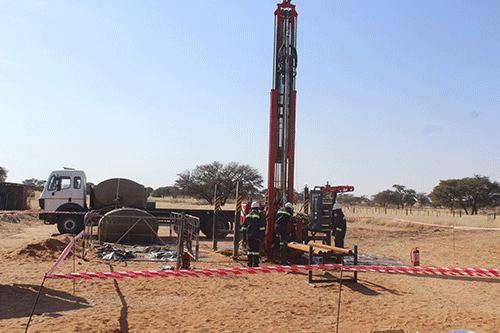Red flags continue being raised by various communities regarding continued uranium exploration activities being conducted in the Omaheke region.
This is as a Russian company looking for uranium in the region continues to ruffle the feathers of local farmers and environmental groups.
The Uranium One Group is a Russian State-owned entity involved in uranium exploration, mining and processing.
Most recently, National Unity Democratic Organisation (Nudo) secretary general Joseph Kauandenge added his voice opposing the uranium exploration in the Aminius constituency.
Kauandenge, who said he was disappointed with the exploration, voiced his opinion last week in the National Assembly
“The exploration came to light as two boreholes were drilled in the Aminius constituency, Kahiokaapa and Omurambauondjombo villages, respectively, for the mentioned purposes. The chemicals used can have serious environmental consequences in the long-term with drastic side effects of people exposed to toxic chemicals and radioactivity, which causes cancer among others as well as potentially irreversible contamination to the groundwater quality,” he said.
The company has proposed the in-situ leaching (ISL) method as a possibility to extract uranium.
ISL, also called in-situ recovery (ISR) or solution mining, is a mining process used to recover minerals such as copper and uranium through boreholes drilled into a deposit.
In-situ leaching works by artificially dissolving minerals occurring naturally in a solid state.
Kauandenge added: “More shockingly, there was no prior consultation from regional, traditional and constituency leadership with the said mining activities of this highly toxic mineral towards the inhabitants of the Aminius constituency”.
He further asserted that the proposed mining technique is not controllable, unsafe and not an environmentally friendly method of mining.
The Nudo SG argued it is inconsequential whether the proposed mine will create much-need jobs, citing similar mining operations in the Khorixas area that created employment but still the respective community languishes with sky-high poverty levels.
Meanwhile, community members from the Aminius constituency, specifically in Kahiokaapa, stated they were not consulted on the uranium exploration, saying they just saw people drilling boreholes in their area.
This lack of consultation forced the Aminius Farmers Association (AFA) to seek clarity from the water ministry.
Similarly, Cliff Karuaihe, on behalf of the Ovaherero Traditional Authority for Aminius, said they are fully against uranium exploration in their area.
He alleged the authority was previously deceived, as they were told the proposed mining venture would not contaminate their underground water.
“At this stands, we are not supporting these activities in the region. They should just leave us alone,” he said.
In July 2022, the Stampriet Aquifer Uranium Mining Committee (SAUM), representing the interests of inhabitants of southeast Namibia in the Omaheke region, also expressed concern with the proposed uranium extraction methods that could potentially harm an aquifer supplying the only fresh drinking water in the area.
In the statement, members of the SAUM expressed fears the groundwater could be polluted by uranium, radioactive decay products of uranium and heavy metals if in-situ leaching is to be utilised.
Earlier this month, local geologist Roy Miller emphatically stated the proposed extraction method must be a no-go area for Namibia.
Miller listed numerous in-situ leaching problems, saying the method releases high-grade uranium into the water and radioactive decay products from uranium, and it dissolves heavy metals into the water and adds sulphate to the water.
Miller said many problems are underground, where nobody can see them: “One cannot see, taste, feel or smell natural radioactivity. It causes cancer; people are petrified of radioactivity. This is slow-acting but deadly poison”.
“Development of uranium in any drinking water aquifer must be prevented. Cancel all mineral exploration licenses in the SAB; prevent any mining in the SAB. Cancel all exploration drilling permits in the SAB. The public must help government to achieve these aims,” he advised.
Despite this resistance to mining in the area, Uranium One Group is adamant all chemicals being used in its exploration activities are environmentally friendly, compared to conventional open-pit and underground mining; thus, farmers in the area should not be worried.
The contentious project has thus far received blessings from government and high office officials, such as deputy mines minister Kornelia Shilunga and Omaheke governor Pijoo Nganate. – mndjavera@nepc.com.na


